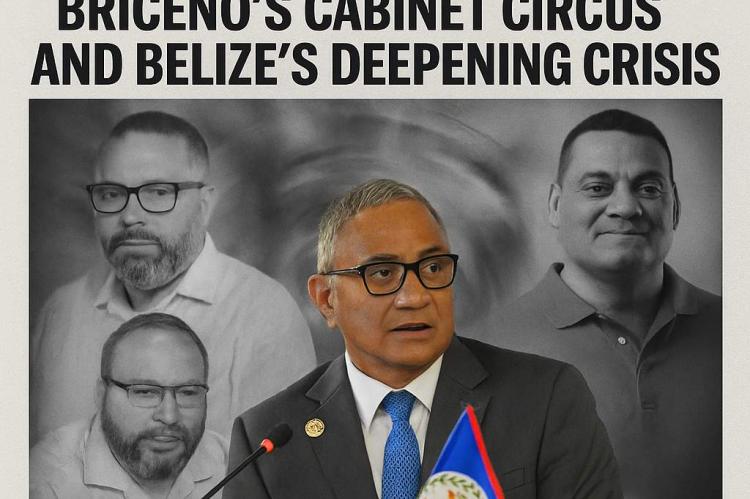A Reshuffle Without Redemption: Briceño’s Cabinet Circus and Belize’s Deepening Crisis
By Omar Silva |Editor/Publisher
National Perspective Belize
Belize City: Wednesday 12th November 2025
When the People’s United Party (PUP) swept into power in November 2020, Belize was at the crossroads of crisis — the economy was gasping under the weight of the pandemic, crime was spiraling, drug planes were landing in remote airstrips across northern and southern districts, and the public treasury was on life support. Amid this chaos, Plan Belize was marketed as the manifesto of hope — a blueprint to “take lands out of idle hands,” empower the working class, and usher in a new era of equitable development.
Five years later, that hope has collapsed into a grim reality.
From Promise to Predicament
The government’s highly publicized social pledges have not materialized in any meaningful way. Although the minimum wage was raised from $3.50 to $5.00 per hour, the cost of living has soared beyond reach. What once bought a week’s worth of basic groceries for $40 BZD now costs over $150 BZD, according to recent consumer index figures. Despite global oil prices stabilizing below US$80 per barrel, Belizeans continue to pay near-record prices at the pump — a reflection not of market forces but of government taxation and inefficiency.
The promise to empower Belizeans through land ownership has equally evaporated. Lands remain locked in the hands of the privileged few and foreign expatriates, while ordinary Belizeans are still queuing in vain before a notoriously corrupt Lands Department. The government’s narrative of equitable land distribution has become a cruel irony — a political talking point without substance.
Meanwhile, violent crime has reached alarming levels. From gang murders in Belize City to rural robberies and home invasions, citizens across the country live under a cloud of insecurity. The State’s reactive approach — declaring States of Emergency and mass detentions — has done little to address the underlying causes of this lawlessness: unemployment, inequality, and hopelessness.
The November 11th Reshuffle: A Diversion, Not a Solution
Against this backdrop, Prime Minister John Briceño’s Cabinet reshuffle announced on November 11, 2025, feels less like leadership and more like desperation. It is, in essence, a case of much ado about nothing — a superficial exercise in political balancing rather than a serious recalibration of national policy.
There is neither strategic depth in its conception nor substance in its execution. This reshuffle was driven not by the nation’s urgent challenges but by the internal tremors within the ruling party. It is about managing loyalties, rewarding allies, and neutralizing rivals ahead of the next general elections — not about delivering governance that works.
Winners, Losers, and Power Plays
The biggest political casualty is Hon. Kareem Musa, who has been stripped of the influential Ministry of Home Affairs, which oversees the Police Department. Musa’s removal is more than administrative — it is symbolic. Once viewed as a potential successor to Briceño, his demotion signals a deliberate move to clip his political wings within a party long haunted by internal rivalries and dynastic ambitions.
The biggest beneficiary, unsurprisingly, is Musa’s own brother — Hon. Henry Charles Usher, son of former Prime Minister Said Musa — who now assumes control of Home Affairs. The optics are unmistakable: power has not shifted to new hands, but merely circulated within a political family dynasty that has dominated Belizean politics for over four decades.
Another major reshuffle sees Hon. Francis Fonseca reclaiming his old stomping ground — the Ministry of Education — in addition to his Foreign Affairs duties. This consolidation gives him command over the largest budget in government, a potent position for any minister with leadership ambitions. By contrast, Hon. Requena, who previously held the Education portfolio, emerges bruised, her short tenure marking yet another case of unfulfilled potential and political sidelining.
Cosmetic Change, Systemic Decay
Beyond these headline shifts, the reshuffle offers little in terms of vision or substance. The minor portfolio swaps have no bearing on the economy’s stagnation, on the sargassum crisis choking tourism, on the steady decline of agriculture, or on the thousands of graduates still unemployed.
Belize’s tourism sector, once the lifeline of the economy, is losing momentum amid regional competition and weak marketing strategy. Sargassum, which continues to smother the coastlines, remains unaddressed despite repeated promises of a national cleanup plan. And with the U.S. tightening controls over Business Process Outsourcing (BPO) operations, thousands of young Belizeans face an uncertain future.
The national debt now exceeds $5 billion BZD, nearly double what it was five years ago, while external dependency grows — not just on multilateral institutions like the IMF and IDB, but also on foreign grants that come with silent conditions.
A Government Running on Fumes
After five years in power, the Briceño administration has no coherent plan to confront the crises it promised to resolve. There is no national strategy for economic diversification, industrialization, or energy independence. What remains is a recycled politics of dependency — beg, borrow, and spend — and a public relations machinery masking dysfunction with slogans.
The reshuffle will not curb the wave of murders. It will not bring down the cost of living. It will not clean the beaches or create jobs. It is, simply put, another act in the political theatre of survival, designed to give the illusion of movement in a government that has lost its direction.
The Road Ahead
Belizeans are not fooled. They have seen these performances before — in the days of “restructuring,” “nationalization,” and “reform.” Today’s reshuffle is just another chapter in the same old play, where the cast changes but the script remains the same.
No reshuffle, however artfully framed, can rescue a country from decline when its leadership is trapped in a colonial-era mindset of control rather than transformation.
Until Belize confronts this fundamental truth — that national regeneration demands more than cosmetic politics — the road to 2026 will be one of uncertainty, disillusionment, and squandered potential.
- Log in to post comments

